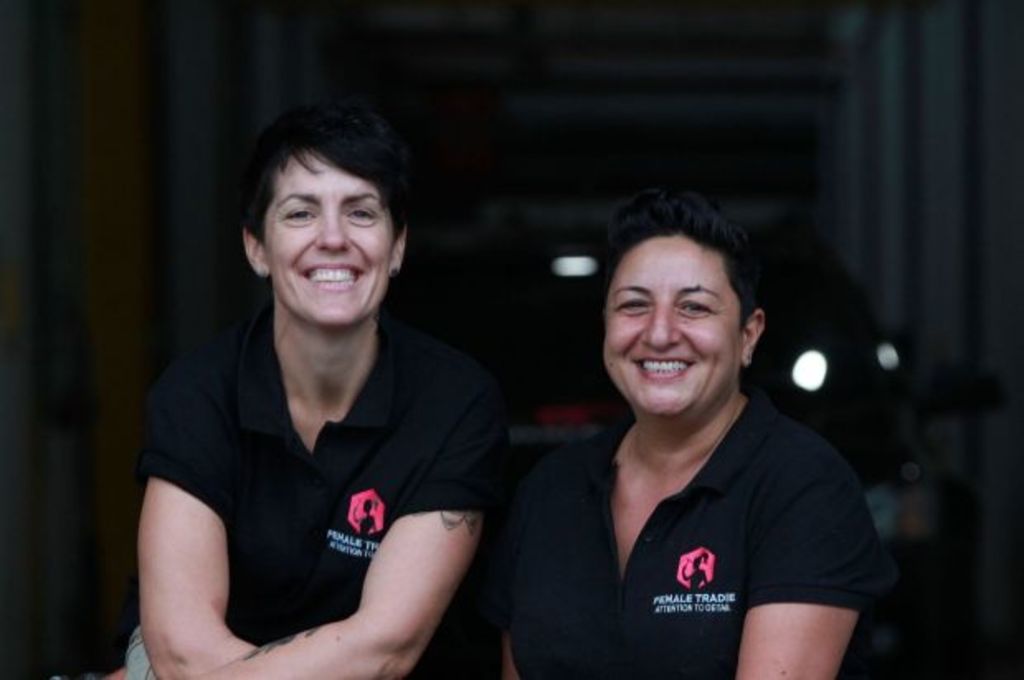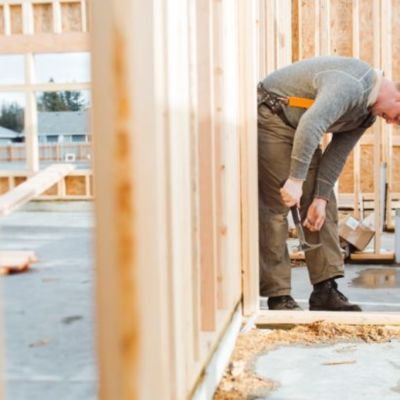The female tradies carving out reputations across Australia

- The change female property leaders want
- How to make your tradie’s life easier
- Nine tips for hiring reliable tradespeople
A pink logo featuring a hammer-wielding woman and the words “Female Tradie” in bold letters is splashed across the side of a black van in Sydney’s Marrickville. Behind the wheel is Penny Petridis, a carpenter, metal worker and builder who started her renovation and building maintenance business, aptly titled Female Tradie, five years ago.
Petridis is part of a new generation of tradies hard at work across Australia, who have got the tools to reshape traditionally male-dominated trades.
“There’s a lot of people that are skeptical about the idea of female tradies, but they’re willing to give us a go and the feedback has been amazing,” Petridis says. “When you get good reviews and testimonials then people know that you do a good job.”
Melissa Parker contracted Female Tradie for an outdoor decking job, after being burnt by previous experiences with builders.
“Penny had to replace my whole decking due to the incompetence of my previous builder, and her team were just wonderful. I felt so comfortable with them,” Parker says. “I’ve told all my friends on Facebook that if somebody’s looking for a builder, she’s it.”
Parker was also pleased to be able to support other women breaking down barriers in a male-dominated field. “What Penny’s doing is great, and I think there needs to be more like her,” she says.
Fed up with having work done by unreliable tradespeople, Wendy Pinch started The Lady Tradies, an online database that connects clients with local tradies across Australia, in 2012.
“It dawned on me that these girls were out there, but they weren’t marketing themselves well, and on the flipside, people wanted to hire them but weren’t able to find them,” she says.

Penny Petridis, founder of Female Tradie, is part of a new generation of tradies hard at work across Australia.
For Pinch, there are a number of factors that motivate people to hire female trades workers, from women who feel more comfortable having another woman around the house to the rise of DIY culture.
“We’re in a big home improvement era and a lot of the time it’s a woman who’s the one opening the door to the tradie, and she’s the one that’s going to make the decisions,” says Pinch. She is regularly contacted not only by customers across Australia, but more and more companies looking to hire female tradies and apprentices to address the gender imbalance in their workforce.
“The customers are just screaming out for [female tradies], and companies are actually starting to target them now too,” Pinch says. “My answer is, girls, get yourself a trade ASAP, because there’s a hell of a lot of work out there waiting for you.”
Wendy Pinch founded The Lady Tradies after being fed up with unreliable tradespeople.
Despite changing social attitudes, women still account for fewer than 2 per cent of tradespeople in Australia. There’s signs of positive growth, though; last year nearly a quarter of the 188,600 apprentices or trainees employed as part of the Australian Apprenticeship Scheme were female. Advocacy and networking groups are also proving successful. Supporting and Linking Tradeswomen (SALT) helps women in trades team up, connecting them via monthly meetings and social media.
“We are trying to change what women think they can do, and what society thinks that women can do,” SALT president Fi Shewring says. The Wollongong painter, decorator and TAFE teacher founded SALT in 2009 after realising how “very isolated” tradeswomen in Australia were.
“It’s been hugely successful and made a big difference, and we can now connect tradeswomen across Australia, and even from overseas,” she says.
“Jobs do not have gender” is the motto at SALT, and advocates like Shewring are working hard to dispel unconscious bias against women plying traditionally male trades.
“If you’re looking for a very skilled workforce, which the trades are, why would you limit yourself to less than 50 per cent of the population?” Shewring says.
Shewring believes the growing numbers of female apprentices indicate that times are changing. Initiatives such as SALT’s community programs, which include the world’s only mobile workshop designed to teach women and girls how to use tools, are also playing a vital role.
“We’ve had three generations of women do the workshops. It affects the way they view the trade; they realise that the skills work is not gender-based,” Shewring says.
“You teach grandma how to use a drill and then she’s more open-minded when her granddaughter comes to her and wants to go into a trade.”
We recommend
We thought you might like
States
Capital Cities
Capital Cities - Rentals
Popular Areas
Allhomes
More










